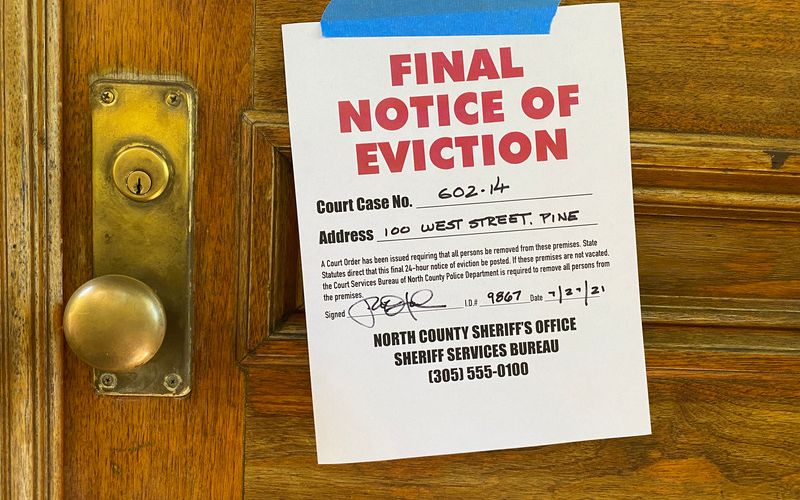Last Updated on March 18, 2024 by Kelvin Nielsen
Are you looking to evict a family member from your Colorado home? If so, this guide has you covered!
Evicting a family member can be an incredibly difficult and emotional process. And rightly so, it can mean severing ties with someone you are related to and presumably care about. You may also feel guilty and ashamed about having to evict a family member. There may also be fear of retaliation. The family member can cause property damage, spread rumors about you, or even resort to violence.
In addition to these emotional factors, evicting a person can be a complex and time-consuming process. In fact, you should expect the process to take anywhere between two weeks and four months depending on a few factors. Such as, the reason for the eviction and whether or not the tenant fights their removal.
The following is everything you need to know regarding Colorado eviction laws for family members.
How To Evict A Family Member In Colorado
Under Colorado laws (Colorado Statutes Title 38 Article 12), an adult child who lives with their parents is considered a tenant. This is true even if the adult tenant doesn’t pay you any rent.
As such, you must follow the proper eviction process when removing a family member. You must not engage in unsavory tenant removal tactics such as throwing the tenant’s personal belongings away, locking them out, or shutting down their utilities. This will not only fail, but may also land you in legal hot soup should the tenant sue you.
Now, the specific route to follow to evict the family member from your property will depend on either of two things. That is, whether or not they have a lease with you.
Evicting a Family Member in Colorado with No Lease
To evict a family member in Colorado with no lease, you must first give them proper notice. Usually, this will be a 21-Day Notice to Vacate. This will give the tenant 21 calendar days to move out.
You must serve the eviction notice on the family member in any of the following ways.
- Give a copy to them in person.
- Post a copy in a conspicuous area on the home, such as on the front door of their bedroom.
- Leave a copy with another family member who is at least 18 years old.
If the family member refuses to leave within 21 days, you can file a complaint in the appropriate county court. A hearing will be scheduled and both you and your relative will have an opportunity to present your cases before a judge.
If the judgment is in your favor, you’ll be issued with a writ of restitution. This is a legal document that will give possession of the property back to you.
Evicting a Family Member with a Lease in Colorado
Do you have an active lease with the family member? If so, then you will need to follow a different eviction process to remove them from the property.
But first things first… what does Colorado law say about how a lease can be established between a landlord and tenant? Well, under state law, a lease can be established in either of three ways. That is, if there is a written agreement, a verbal agreement, or if a landlord accepts a payment as rent.
To evict a tenant with a lease in Colorado, you will need to do the following.
- Have a just cause to evict the tenant. You cannot just wake up one day and decide that you no longer want the family member around. You must have a legitimate reason for their eviction. Examples include failure by the tenant to pay rent, engaging in illegal activity at the rental, and causing excessive property damage.
- Serve the tenant with proper notice. The specific type of eviction notice to serve them will depend on the reason for the eviction. If evicting the tenant for property damage, for instance, then you must serve them a 3-day eviction notice.
- File a lawsuit in the appropriate county court. Filing a complaint will set you back by between $85 and $135. After successful filing, a copy of a summons and complaint will need to be served on the tenant. This will be done by a process server.
- Attend the hearing for the judgment. Once the court’s clerk has issued a summons, a hearing will usually take place between 7 and 14 days. If the judgment is in your favor, the court will issue you with a writ of restitution. This will be the tenant’s final notice to leave the rental unit. If they refuse to leave, the sheriff will have to remove them forcefully.
Related Post: How to Report a Landlord in Colorado: A Clear Guide
Frequently Asked Questions (FAQs): Colorado Eviction Laws for Family Members
Q: How to get someone out of your house who won’t leave in Colorado?
A: The only way to evict someone out of your house is by obtaining a court order. You cannot try to evict them in any other way, such as locking them out, throwing out their personal belongings, or shutting down their utilities. These are all examples of “self-help” eviction tactics and are illegal as per Colorado law.
Generally speaking, to evict a person, you’ll need to serve them proper notice, file a lawsuit in court, and then obtain a court order (forcible entry and detainer).
Q: How hard is it to evict someone in Colorado?
A: How hard it becomes for a landlord to remove someone from their property depends on the reason for the eviction and the tenant’s rights. As a landlord, you must follow due process under the law, and the tenant has a right to defend themselves in court.
Generally speaking, though, expect the process to take around 2 week to 4 months, depending on several things.
Q: What is an illegal eviction in Colorado?
A: An illegal eviction can take many forms. Here is a guide to get you started.
Q: Can you evict a spouse in Colorado?
A: No, in Colorado, a spouse cannot evict the other spouse from their marital home. To evict your spouse, you will need to first file for a divorce. It will then be upon the divorce court to decide who has a right to continue staying at the home and who must leave.
Q: What is the difference between a tenant and a guest in Colorado?
A: As already mentioned, a tenant is a person who has been able to meet any of the aforementioned requirements. That is, has an oral- or written agreement, or has paid rent in exchange for living there.
Guests, on the other hand, are only visitors who stay for a short period. They don’t enjoy the same rights and responsibilities tenants have under the lease and state law. That said, a guest can become a tenant under certain circumstances. For instance, if they spend most days and nights at the unit for weeks or even months at a time.
Conclusion
There you have it. Colorado eviction laws for family members. As a parent wanting to remove an adult child, you must follow the same eviction process to remove an adult child from your home as you would any other tenant. If you have a question, please leave a comment for expert advice!
Disclosure: The content herein isn’t a substitute for advice from a professional attorney. It’s only meant to serve educational purposes. If you have a specific question, kindly seek expert attorney services.
Sources: Colorado Statutes Title 38 Article 12, How to Evict a Tenant in Colorado with no Lease, Colorado Landlord Responsibilities, What is an Illegal Eviction in Colorado,

Hi, I’m Kelvin Nielsen, an experienced landlord and accomplished real estate lawyer. My focus is on answering your questions about renting in the hopes of making your life as a renter or a landlord a bit easier.







